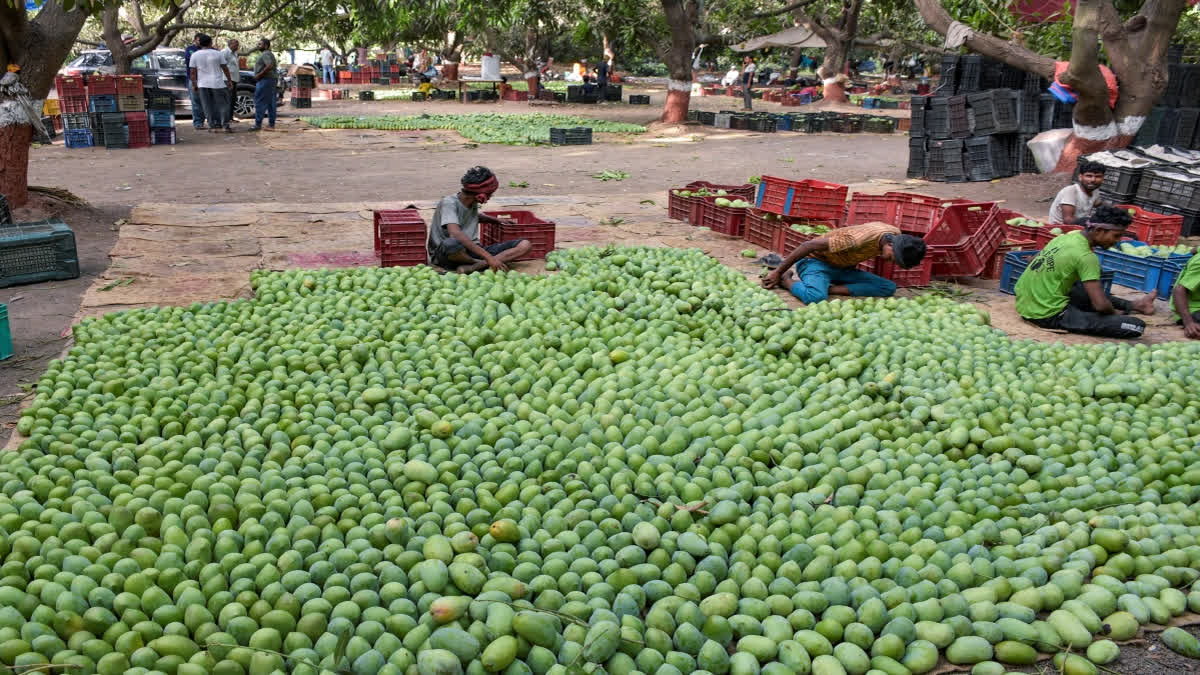Hyderabad: National Mango Day is celebrated across India on July 22 every year. Mango, being an integral part of Indian history and culture is one of the most loved Indian fruits, and it is known as the 'king of fruits'. It is consumed worldwide. Mango is one of the most-relished fruit.
History of the International Mango Festival:
The roots of the International Mango Festival can be traced back to 1987 when the National Horticulture Board of India had a bright idea—to celebrate mango. Since then, it has become an annual tradition, eagerly awaited by mango lovers across the nation. Bustling mango markets, vibrant mango exhibitions, and an abundance of fruity delights await visitors during this mango-filled extravaganza.
Mango is more than simply a fruit; in many nations around the world, it is an integral component of culture and history. Mangoes were first cultivated in India more than 5000 years ago.
Mango is a fruit that belongs to the cashew family and has the scientific name Mangifera Indica (Anacardiaceae). Mangoes are a fruit that is part of the drupe family. Mangoes have a thin, waxy, red and green skin that covers the outside. Inside, there is a large pit in the middle of the bright orange flesh. Mangoes have a sweet, tangy flavour.
The cultivation of mango is believed to have originated in Southeast Asia. Mango has been cultivated in southern Asia for nearly six thousand years. India ranks first among the world's mango-producing countries accounting for about 50 per cent of the world's mango production.
The name "mango" is likely derived from the Malayam word "manna," which the Portuguese adopted when they arrived in Kerala in 1498 to trade in spices. The tree was not introduced into the Western Hemisphere until around 1700 due to the difficulty of transporting the seeds, and after being planted in Brazil, it reached the West Indies in approximately 1740.
Mango production in India:
Mangoes have a long and rich history in India. The ancient Indian scriptures, including the Vedas and the Puranas, mention the mango fruit as a symbol of love, fertility, and prosperity. During ancient times, it was called 'Rasala' or 'Sahakara'. India with a total mango production of 25 million metric tons, holds the title of largest mango producer in the world, followed by China, Indonesia, Pakistan and Mexico.
India leads global mango production with an impressive 25 million metric tons. Renowned for varieties like Alphonso and Kesar, its mangoes are cherished worldwide for their exquisite taste and aroma. Indian farmers, blending traditional wisdom with modern techniques, sustain this thriving mango industry, symbolising expertise over sheer quantity.
Types of Mango in India:
In India, about 1,500 varieties of mango are grown including 1,000 commercial varieties. Each of the main varieties of mango has a unique taste and flavour. Different types of mangoes are grown in different states of India, here is the list:
- Alphonso Mangoes - Ratnagiri, Maharashtra
- Kesar Mangoes - Junagadh, Gujarat
- Dasheri Mangoes - Lucknow and Malihabad, Uttar Pradesh
- Himsagar and Kishan Bhog Mangoes - Murshidabad, West Bengal
- Chausa Mangoes - Hardoi, Uttar Pradesh
- Badami Mangoes - North Karnataka
- Safeda Mangoes - Andhra Pradesh
- Bombay Green Mangoes - Punjab
- Langra Mangoes - Varanasi, Uttar Pradesh
- Totapuri Mangoes - Bangalore, Karnataka
- Neelam Mangoes - Andhra Pradesh
- Raspuri Mangoes - Karnataka
- Malgoa/Mulgoba Mangoes - Salem, Tamil Nadu
- Lakshmanbhog Mangoes - Malda, West Bengal
- Amrapali Mangoes - All Over India
- Imam Pasand Mangoes - Andhra Pradesh/Telangana/Tamil Nadu
- Fazli Mangoes - Bihar/West Bengal
- Mankurad Mangoes - Goa
- Paheri/Pairi Mangoes - Gujarat
- Mallika Mangoes - All Over India
- Gulab Khaas Mangoes - Bihar, Jharkhand, and West Bengal
- Vanraj Mangoes - Gujarat
- Kilichundan Mango - Kerala
- Rumani Mangoes – Chennai
Health Benefits Of Mango:
Rich in vitamins and minerals: Mangoes are high in A, C, E vitamins, along with potassium and magnesium, which help the immune system, skin health, and balance body fluids.
Improves digestion: Mango's cooling effect, and digestive enzymes like amylase break down carbs, helping with indigestion, bloating, and constipation.
Supports heart health: Fiber, potassium, and antioxidants lower cholesterol, control blood pressure, and fight oxidative stress, reducing the risk of heart disease and stroke.
Enhances vision: Vitamin A from mangoes helps maintain good eyesight, preventing macular degeneration and improving eye health.
Boosts immunity: Vitamin C strengthens the immune system, helping fight off infections and diseases, including colds, flu, and seasonal illnesses.
Promotes weight loss: Although sweet, mangoes aid in weight loss by making you feel full with fiber and having low calories and fat.
Alleviates heat-related issues: Mango's cooling effect can help balance body heat during summer, reducing the risk of heat stroke and dehydration from drinking mango juice.
Supports brain health: B6 from mangoes boosts cognitive function, making neurotransmitters for better mood and mental clarity.
Detoxifies the body: Mango's diuretic properties help remove toxins for kidney health and prevent urinary tract infections.
Improves skin health: Vitamins E and beta-carotene in mangoes nourish skin from within, aiding in a youthful look and reducing aging signs, and mango pulp can help with sunburns and dry skin. For optimal benefits, Ayurveda recommends eating mangoes ripe and raw.



